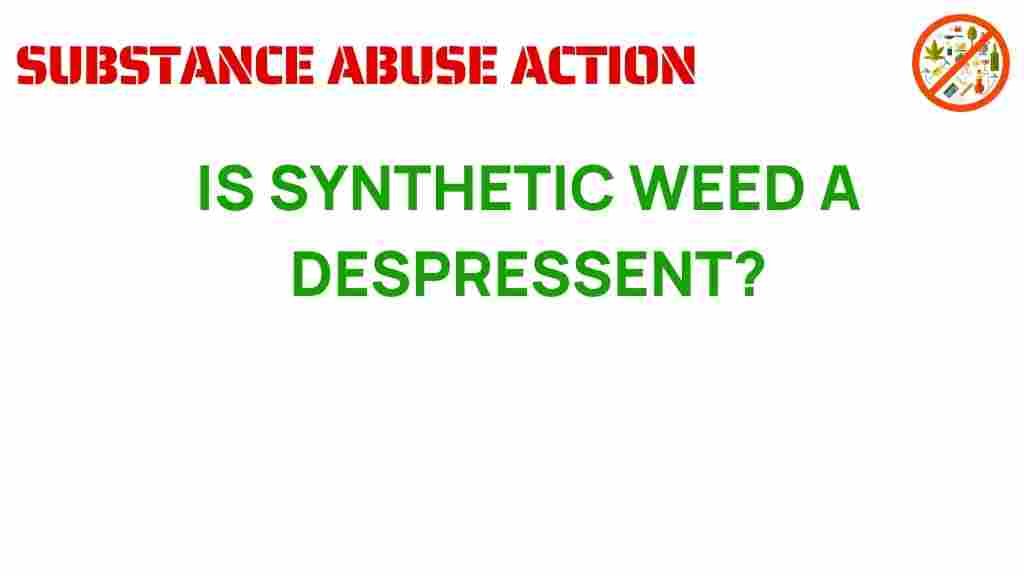Is Synthetic Weed a Hidden Depressant? Exploring the Truth Behind Synthetic Weed
The world of drugs and their effects on mental health is vast and complex. Among these substances, synthetic weed has gained notoriety in recent years. Often marketed as a safe alternative to cannabis, many users are unaware of its potential risks and hidden effects. This article aims to uncover the truth about synthetic weed, particularly its classification as a depressant and its impact on addiction, mental health, and substance abuse.
What is Synthetic Weed?
Synthetic weed, also known as synthetic cannabinoids, refers to a class of drugs that mimic the effects of natural cannabis. These substances are created in laboratories and sprayed onto plant material, which can then be smoked or vaporized. Unlike natural cannabis, which contains a variety of cannabinoids such as THC and CBD, synthetic weed can contain numerous unknown chemicals, making its effects unpredictable.
The Mechanics of Synthetic Weed
Synthetic cannabinoids interact with the same receptors in the brain as THC, the primary psychoactive component of cannabis. However, their potency can be significantly greater than that of natural cannabis, leading to a range of effects that can be much more intense and, at times, dangerous.
- Unpredictable effects: Users often report feeling different from what they would experience with natural cannabis.
- Higher risk of overdose: Due to its potency, synthetic weed can lead to severe reactions.
- Varied chemical composition: Each batch can be significantly different, complicating the understanding of its effects.
Understanding the Depressant Nature of Synthetic Weed
Many users may not realize that synthetic weed can act as a depressant. While it is often associated with stimulation and euphoria, some of its effects can lead to feelings of sedation and lethargy. This duality is what makes synthetic weed particularly dangerous for mental health and addiction.
Effects of Synthetic Weed on Mental Health
The use of synthetic weed can have several mental health implications, including:
- Anxiety: Many users report increased anxiety and paranoia after using synthetic cannabinoids, which can exacerbate existing mental health issues.
- Depression: The depressant effects of synthetic weed can lead to feelings of sadness, hopelessness, and a lack of motivation.
- Psychotic episodes: Some individuals may experience hallucinations or delusions, particularly with high doses.
Addiction and Substance Abuse Potential
Another aspect to consider is the potential for addiction. While synthetic weed is often perceived as less addictive than traditional drugs, it can still lead to substance abuse. The following points highlight the addiction potential:
- Regular users may develop a tolerance, needing more of the substance to achieve the same effects.
- Withdrawal symptoms can occur, including irritability, insomnia, and mood swings.
- The euphoric effects can lead users to seek out synthetic weed repeatedly, increasing the risk of dependency.
Safety Concerns Surrounding Synthetic Weed
Safety is a paramount concern when discussing synthetic weed. Users often underestimate the risks involved with these substances. Here are some critical safety concerns:
- Unregulated production: Synthetic weed is often produced in unregulated environments, leading to contamination and unsafe chemical mixtures.
- Unknown long-term effects: The long-term effects of synthetic cannabinoids are not well studied, leaving many questions about their safety.
- Legal implications: The legality of synthetic weed varies by location, and using such substances can lead to legal consequences.
Recognizing the Signs of Synthetic Weed Use
Understanding the signs of synthetic weed use can help individuals identify potential issues in themselves or others. Common signs include:
- Changes in mood or behavior, such as increased irritability or withdrawal from social activities.
- Physical symptoms like rapid heart rate, high blood pressure, or nausea.
- Neglecting responsibilities or academic performance due to substance use.
Step-by-Step Process: Seeking Help for Synthetic Weed Addiction
If you or someone you know is struggling with synthetic weed addiction, it is crucial to seek help. Here’s a step-by-step process to follow:
- Recognize the problem: Acknowledge the signs of addiction and the impact on mental health.
- Reach out for support: Talk to friends, family, or professionals who can provide guidance and support.
- Consult a healthcare professional: A doctor or mental health specialist can assess the situation and recommend treatment options.
- Consider therapy or counseling: Behavioral therapies can be effective in addressing addiction and underlying mental health issues.
- Join support groups: Connecting with others who have similar experiences can provide encouragement and community.
Troubleshooting Tips for Managing Synthetic Weed Effects
In case of adverse reactions to synthetic weed, it’s important to know how to manage those effects:
- Stay calm: If experiencing anxiety or paranoia, try to find a quiet, safe space to relax.
- Seek hydration: Drink water to help flush out the substance from your system.
- Consider professional help: If symptoms are severe, don’t hesitate to seek medical attention.
Long-term Effects and Recovery
Understanding the long-term effects of synthetic weed is crucial for recovery. Users may face ongoing mental health challenges that require continuous support. Recovery is a journey that may involve therapy, lifestyle changes, and the need for ongoing support from friends and family.
Conclusion
Synthetic weed is indeed a complex substance that can act as a hidden depressant. Its effects on mental health, potential for addiction, and associated safety concerns make it a significant topic of discussion in the realm of drug use and substance abuse. Understanding the risks, recognizing addiction signs, and knowing how to seek help are essential steps in addressing the challenges posed by synthetic weed.
If you or someone you know is struggling with substance abuse, consider reaching out to professionals who can provide assistance. For more information on mental health resources, visit Mental Health America.
For further reading on the effects of cannabis and synthetic drugs, check out this comprehensive guide: Understanding Cannabis and Synthetic Drugs.
This article is in the category Addiction and created by SubstanceAbuseAction Team
